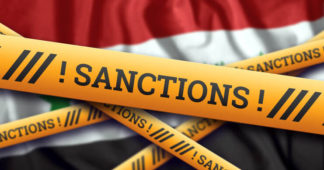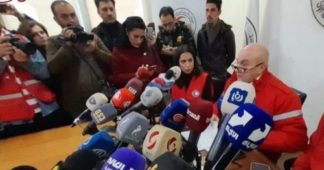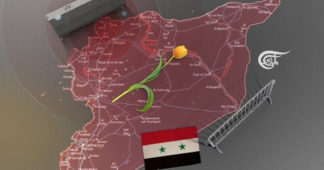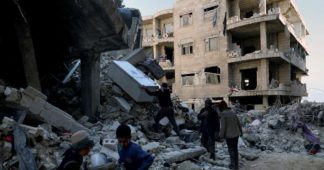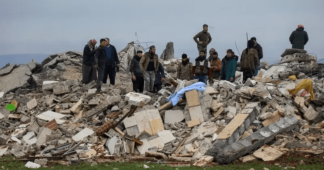The US Treasury has issued a 180-day waiver on certain sanctions imposed on Syria to allow for earthquake relief. However, the US and its allies have yet to offer meaningful assistance to Syria even as Venezuela, China, Palestine, and others have dispatched aid and specialists
February 10, 2023
On Thursday, February 9, the United States Treasury Department announced a temporary waiver of certain sanctions imposed on Syria to facilitate relief and recovery efforts in the earthquake-hit country. The move follows growing international outrage and public appeals, including by the Syrian government and countries such as Venezuela and China, to remove the brutal and illegal sanctions that the US has imposed on Damascus.
At least 21,719 people have died—as of February 10—after a 7.8 magnitude earthquake on February 6 devastated large parts of southern and central Turkey as well as northern and western Syria. Over 79,000 people have been injured and over 3.7 million have been displaced since then, with rescue operations still underway in search of survivors in the midst of aftershocks.
The US Treasury’s Office of Foreign Assets Control (OFAC) issued a “blanket” Syria General License (GL) 23, “which authorizes for 180 days all transactions related to earthquake relief that would be otherwise prohibited by the Syrian Sanctions Regulations (SySR).”
Addressing a joint press conference at the United Nations headquarters on February 7, Syria’s Permanent Representative to the UN Bassam al-Sabbagh explained how sanctions were impeding humanitarian relief and access: “Lots of cargo planes refuse to land at Syrian airports because of the American and European sanctions. So, even those countries who want to send humanitarian assistance, they cannot use the airplane cargo because of the sanctions.”
The head of the Syrian Red Crescent, Khaled Hboubati, stated during a press conference on Tuesday that “There is no fuel even to send [aid and rescue] convoys, and this is because of the blockade and sanctions.”
Meanwhile, in its statement on February 9, the US government reiterated that its sanctions do not target “legitimate humanitarian assistance”—a claim proven false in other countries that have also been targeted by US sanctions. The risk of obstruction of humanitarian aid is also heightened due to possible overcompliance, and particularly in the case of Syria due to the “unfettered emergency powers” and “extraterritorial reach” granted under the US’s Caesar Act.
The US claims that GSL 23 “expands upon” the “broad humanitarian authorizations already in effect under the SySR for NGOs, international organizations (IOs) and the US government.”
However, over the past week, people on social media platforms have reported that US-based fundraising company GoFundMe was suspending accounts that were attempting to raise money for Syria.
Countries dispatch aid to Syria and Turkey
While the US and its allies rushed to mobilize and dispatch rescue teams and supplies to Turkey, they have dragged their feet to provide even the bare minimum aid for Syria by refusing to meaningfully lift sanctions to allow aid to reach the country. Despite this, there are countries around the world that have been providing critical on-ground assistance to both Syria and Turkey.
On Thursday, 25 specialists part of the Simon Bolivar Humanitarian Task Force arrived from Venezuela to Damascus accompanied by 12 tonnes of medicine, drinking water, and food. A day prior, the government of Venezuelan President Nicolas Maduro had dispatched 52 specialists to Turkey and Syria to assist with relief efforts.
A team of Cuban doctors from the Henry Reeve International Brigade has also arrived in Turkey. On Wednesday, Syria’s ambassador to Cuba Ghassan Obeid confirmed that 27 doctors from Cuba will also arrive in Syria soon to assist affected populations and local authorities.
China announced that it will be providing the first tranche of $5.9 million in emergency aid to Turkey. Beijing also dispatched an 82-member rescue team that arrived in Turkey’s Adana airport on Tuesday, bringing with them 20 tonnes of medical aid and rescue supplies.
On Thursday, China’s ambassador to Syria Shi Hongwei told CGTN that the first Chinese rescue team had arrived in Damascus, accompanied by an initial batch of medical supplies. A spokesperson from the Chinese Foreign Ministry had announced on Wednesday that China will offer USD 4.4 million in emergency aid to Syria.
A team of 73 rescuers, including members of the Palestinian Red Crescent and the Palestinian Civil Defense, headed by the Palestinian International Cooperation Agency (PICA), left for Jordan from the Occupied West Bank on Thursday, from where they will be divided into two teams—one headed to southern Turkey and another headed to northwest Syria.
Russia had dispatched four aircrafts on Monday with over 100 emergency response specialists, including medics to assist in search and rescue operations in Turkey and Syria. Algeria also sent over 100 tonnes of medical supplies, food, and tents, as well as a Civil Protection team that arrived in Aleppo earlier this week. India has also dispatched aid supplies to Syria, along with dispatching rescue teams to Turkey.
Countries including Iraq, Jordan, UAE, Pakistan, and Tunisia have also provided emergency assistance and supplies, even as various other countries have expressed messages of solidarity.
The UN has stressed that sanctions should not prevent the delivery of assistance to the Syrian people. According to the International Organization of Migration (IOM), 14 humanitarian aid trucks had crossed into northwestern Syria on Friday, bound for rebel-held Idlib.
From Iran, the sixth plane carrying humanitarian aid, including infant formula and food, was reported to have landed in Syria early on Friday. The Iranian army and the Iranian Revolutionary Guards Corps (IRGC) have also dispatched equipment for a 50-bed mobile hospital along with 70 relief and medical staff to Turkey.
The first Iranian plane had landed in Damascus on Tuesday, carrying 45 tonnes of food and medical supplies. Iran has also sent planes carrying aid to Latakia and Aleppo—where IRGC commander Brigadier General Esmail Qaani arrived late on February 8 to supervise aid delivery.
Meanwhile, Israel has already threatened a military attack, with an unnamed military official citing “information” that “indicated” that Iran might “take advantage” of the situation and send weapons along with humanitarian aid to Syria.
Israel has continued to carry out illegal and unilateral acts of aggression against Syria, including airstrikes that have killed numerous civilians and caused damage to critical infrastructure. According to Al Mayadeen, the airport in Damascus, which has been repeatedly targeted in such attacks, is reportedly still undergoing repairs after it was hit by an Israeli airstrike in January.
Sanctions on Syria
The urgent need for the removal of illegal sanctions on Syria is not limited to the immediate earthquake recovery efforts. The fact is that Western sanctions had already precipitated an economic and infrastructural collapse in Syria well before the earthquake hit this week.
In November 2022, following a visit to the country, UN Special Rapporteur Alena Douhan described the impact of the “outrageous” and “long-lasting” unilateral sanctions that were “suffocating” millions of Syrians. Douhan stated that 90% of Syria’s population was living below the poverty line, and access to food, water, electricity, fuel, shelter, transportation, and healthcare were limited. She added that more than half of the country’s vital infrastructure had either been completely destroyed or was severely damaged.
At the same time, unilateral sanctions on key sectors including oil, gas, electricity, and trade had “quashed” the national income and undermined efforts towards economic recovery and reconstruction.
“Maintaining unilateral sanctions amid the current catastrophic and still-deteriorating situation in Syria may amount to crimes against humanity against all Syrians,” Douhan had warned.
Threats to public health and food security have been heightened due to the unavailability of equipment and spare parts to fix water distribution and irrigation systems. There are acute disruptions in access to electricity, which have also impacted the functioning of medical equipment in hospitals.
As the US boasts of its “commitment to support the people of Syria through their ongoing earthquake crisis,” the question arises: what does a 180-day waiver on earthquake relief transactions actually achieve in the face of this level of destruction?
As Syria looks towards long-term reconstruction and recovery, any commitments of support or assistance are rendered meaningless in the absence of the total lifting of the illegal and inhumane sanctions that continue to choke the country.
We remind our readers that publication of articles on our site does not mean that we agree with what is written. Our policy is to publish anything which we consider of interest, so as to assist our readers in forming their opinions. Sometimes we even publish articles with which we totally disagree, since we believe it is important for our readers to be informed on as wide a spectrum of views as possible.
